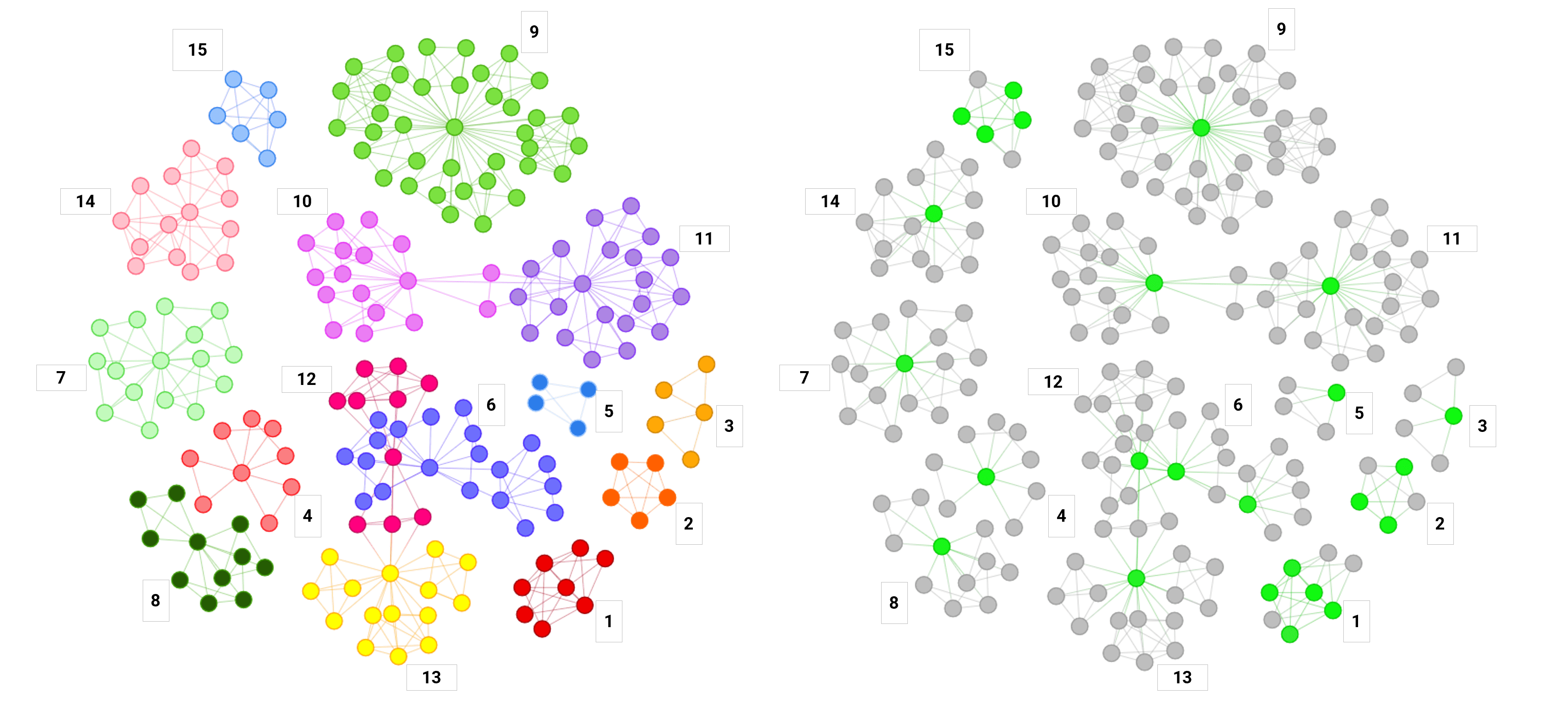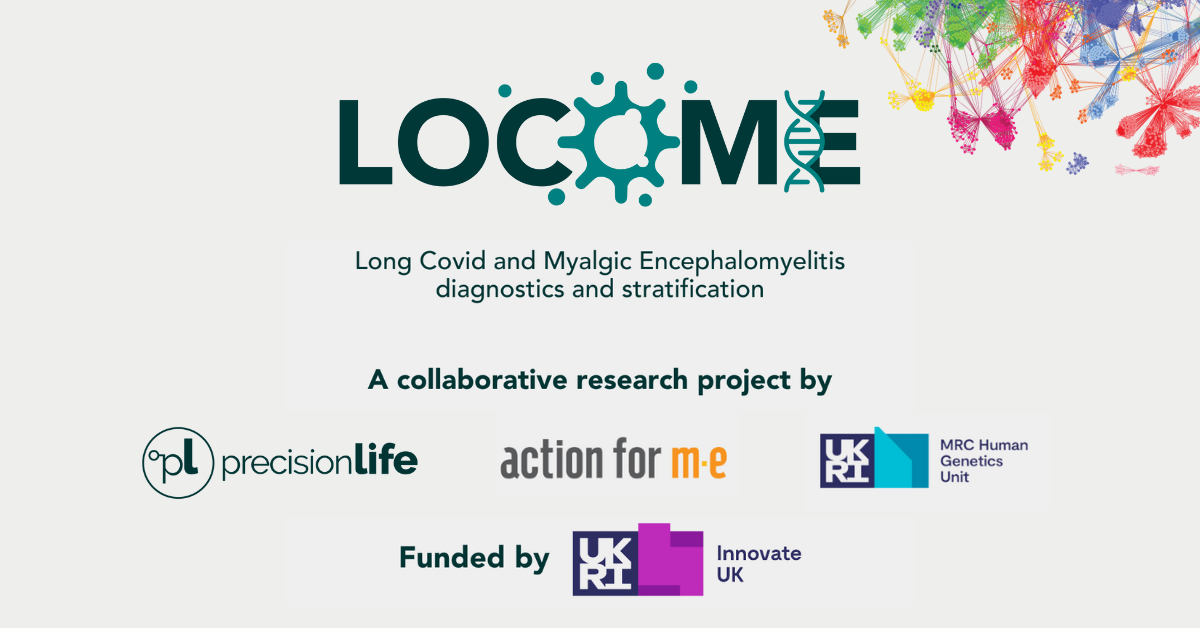PRESS RELEASE
PrecisionLife Project Awarded Innovate UK Grant to Improve Diagnosis and Treatment of ME/CFS and Long Covid
-
Innovative precision medicine project to diagnose ME/CFS and long Covid more accurately and find the most appropriate treatment options for patients.
-
PrecisionLife will perform combinatorial analysis on long Covid datasets and the world's largest collection of ME/CFS patient data to identify the mechanisms causing the diseases.
-
The project builds on previous studies into ME/CFS and long Covid undertaken by PrecisionLife in collaboration with Action for M.E. and University of Edinburgh.
OXFORD, BRISTOL, EDINBURGH, UK – 15 December 2023 – Leading computational biology company PrecisionLife®, which is driving precision medicine in complex chronic diseases, the ME/CFS charity Action for M.E., and the MRC Human Genetics Unit at the Institute of Genetics and Cancer, University of Edinburgh have been awarded a £622,000 grant by Innovate UK's Advancing Precision Medicine programme to improve diagnosis and treatment for the millions of people affected by ME/CFS and long Covid.
ME/CFS and long Covid are debilitating conditions profoundly affecting the quality of life of over two million people in the UK. PrecisionLife’s platform recently identified the first reproducible genetic associations with ME/CFS1 and long Covid2. Before then, little was known about the genetic causes of either disease, which have no effective diagnostic tools or disease modifying therapies.
The LOCOME (LOng COvid and Myalgic Encephalomyelitis diagnostics and stratification) project will extend PrecisionLife’s previous analyses to include deeper multimodal data for a wider group of patients from long Covid datasets and the world's largest study of ME/CFS, led by the DecodeME Partnership, which includes Action for M.E. and the MRC Human Genetics Unit.
PrecisionLife will use its precision medicine and mechanistic patient stratification approach to identify the factors driving disease in different patient subgroups through combinatorial analysis of the DecodeME data. The insights and biomarkers that this generates will be used to create the first predictive diagnostic tools to rapidly triage people presenting with potential ME/CFS or long Covid symptoms and identify novel repurposing opportunities to accelerate access to disease modifying treatments for patients.
“LOCOME will demonstrate a powerful new ability to generate clinically useful disease insights from patient datasets that can be applied in a rapid and cost-efficient manner in healthcare settings to improve diagnosis and treatment of the most challenging and costly diseases which have huge unmet medical need. Upon demonstrating success for ME/CFS and long Covid patients, we hope to also apply this precision medicine approach to multiple diseases of aging in respiratory, dementia, autoimmune, and metabolic diseases to benefit millions more people.”
Steve Gardner, PhD, Chief Executive Officer, PrecisionLife
“We are delighted to partner with PrecisionLife, through the Genetic Centre of Excellence that we are establishing with the University of Edinburgh. People with M.E. deserve greater investment in research to help identify a diagnostic test and treatments and this is another step on that journey. By working together, we aim to accelerate research into personalised diagnosis and treatment.”
Sonya Chowdhury, PhD, Chief Executive, Action for M.E.
“ME/CFS and long Covid come at a high cost to the people living with these conditions, the economy, and the NHS, yet we know less about their molecular causes and how to treat them effectively than we do about many rarer and less disabling diseases. By injecting badly needed robust genetic evidence into these research fields, and by improving the wider perception of research in these areas, we hope to encourage skilled investigators to apply their cross-disciplinary expertise to address future challenges in ME/CFS and long Covid research. The LOCOME project should provide valuable new insights from genetic data on what is going wrong in these devastating diseases.”
Professor Chris Ponting, DPhil, Chair of Medical Bioinformatics, MRC Human Genetics Unit
ENDS
[1] Das, S., Taylor, K., Kozubek, J. et al. Genetic risk factors for ME/CFS identified using combinatorial analysis. J Transl Med 20, 598 (2022). https://doi.org/10.1186/s12967-022-03815-8
[2] Taylor, K., Pearson, M., Das, S. et al. Genetic risk factors for severe and fatigue dominant long COVID and commonalities with ME/CFS identified by combinatorial analysis. J Transl Med 21, 775 (2023). https://doi.org/10.1186/s12967-023-04588-4
Contacts for further information
PrecisionLife - Noah Konig, Marketing Director, noah@precisionlife.com / +441865 575170
Action for M.E. - communications@actionforme.org.uk
University of Edinburgh (Medicine & Vet Medicine) - Guy Atkinson, PR and Media Manager, and Jess Conway, PR and Media Manager, guy.atkinson@ed.ac.uk / jess.conway@ed.ac.uk / +44131 650 9547
Media Guidelines
Please refer to the Action for M.E. media guidelines for reporting on Myalgic Encephalomyelitis (M.E.). These can be accessed from: www.actionforme.org.uk/uploads/images/2023/03/Action_ME_-_Media_Guidelines.pdf
About PrecisionLife
PrecisionLife® is a pioneering computational biology company changing the way the world predicts, prevents, and treats chronic disease by finding better, more personalized treatment options for patients.
With a vast repository of intellectual property and unique insights into disease biology across over 50 indications, we have developed the most extensive drug discovery pipeline of precision targeted therapies.
Our innovative precision medicine analytics approach enables us to discover new subgroups of patients with mechanism-based patient stratification biomarkers to understand the causes of complex diseases, identify new treatments, derisk and accelerate clinical trials, develop accurate diagnostic tools, and personalize risk prediction and disease prevention for people with unmet medical needs.
To learn more about our groundbreaking work, please visit precisionlife.com, connect with us on LinkedIn at @PrecisionLifeAI and follow us on X/Twitter at @PrecisionLifeAI.
About Action for M.E.
Action for M.E. is a dynamic charity committed to improving the lives of individuals impacted by Myalgic Encephalomyelitis (M.E.). The organisation focuses on support, advocacy, and research, striving to bring positive change for those living with M.E. Their mission includes raising awareness, driving research initiatives, providing high-quality healthcare and information services, and establishing crucial peer networks. Through collaboration and understanding, Action for M.E. aims to improve the quality of life for individuals navigating the challenges of this debilitating disease. For more information or to access support, visit our website. You can also follow us on Instagram, X\Twitter and Facebook and connect with us on LinkedIn.
About the MRC Human Genetics Unit, University of Edinburgh
The mission of the MRC Human Genetics Unit is to understand how the human genome works and how changes in DNA affect health and cause disease.
Genome interpretation is critical for the diagnosis of genetic diseases and cancers and for the development of new and better-tailored treatments for people living with these conditions.
The Unit combines the latest computational and experimental technologies while bringing together researchers and clinicians from various disciplines to deliver on this mission.
About DecodeME
The DecodeME DNA study is the largest genetic study in the world, which aims to build understanding about myalgic encephalomyelitis/chronic fatigue syndrome (ME/CFS) and ultimately find treatments.
The study is led by the DecodeME Partnership, which brings together a unique collaboration of researchers, people with ME/CFS, carers and the public to advance understanding about the disease.
A team of genetics experts at the MRC Human Genetics Unit, University of Edinburgh, led by Professor Chris Ponting, will run the science arm of the study. They are working in equal partnership with the charity Action for ME, the Forward ME alliance of UK charities, Medical Research Council (MRC), the National Institute for Health and Care Research (NIHR) and people with lived experience of ME/CFS. The robust scientific study is backed by all the main ME/CFS charities in the UK.
About Innovate UK
Innovate UK is creating a better future by inspiring, involving and investing in businesses developing life-changing innovations.
We provide targeted sectors with expertise, facilities, and funding to test, demonstrate and evolve their ideas, driving UK productivity and economic growth. Join our network and communities of innovators to realise the potential of your ideas and accelerate business growth.
Name Surname, Position, Company



